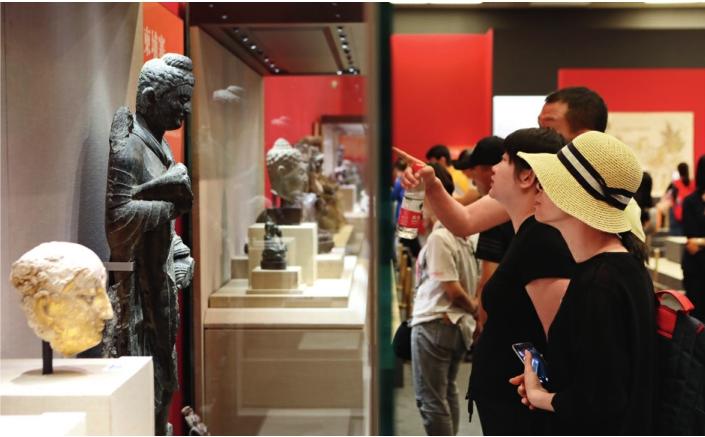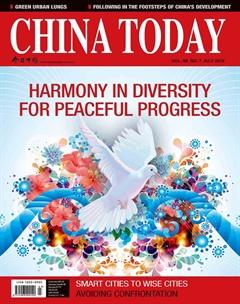Following in the Footsteps of China’s Development
By staff reporter ZHOU LIN



“OVER the past two decades, I have gone to many places around China and thus I dare say that I have some knowledge of this ancient civilization,” Alistair Michie, the secretary-general of the British East Asia Council (BEAC), told China Today in a modest way at the Conference on Dialogue of Asian Civilizations in May.
Over the past 30 years, Michie has traveled to 28 provinces, municipalities, and autonomous regions around China, devoting himself to promoting the exchanges and cooperation between China and the world. This experience has made him a senior Western expert on the studies of China and won him the Chinese Government Friendship Award in 2013.
Fascinated with Chinese Civilization
It was in 1993 when Michie came to China for the first time.
“The scene I saw on the first day was unimaginable,” Michie recalled how he was taken to the Forbidden City the moment he got off the plane. “The imperial palace was breathtaking.”
He was also impressed with the rapid development resulting from Chinas reform and opening-up policies. He then visited several places across the nation and was astonished to discover that Chinas industrialization speed was unprecedented. “I thus became interested in Chinese history and its culture, and was curious to learn more behind the reason of Chinas skyrocketing economic growth,” he said.
Standing on the bank of the BeijingHangzhou Grand Canal, Michie was shocked again to learn of the acclaimed worlds longest man-made waterway and another treasure in the Chinese engineering history, the Great Wall. These were the expressions of the wisdom of the ancient Chinese.
Michie started to search for all available materials about the canal when he flew back to the U.K. Although there were not so many written records, he managed to find a book titled Science and Civilization in China written by the famous British scholar, Joseph Needham(1900-1995).
Needham wrote in the book that people seldom know that there is no ancient country in the world that has made such great contributions to the civil engineering as China did. These words changed Michies understanding of civilization, China, and his whole life as well.
“China is a great nation with its vast territory, splendid culture, and long history, but has not been recognized or understood by the outside world,”said Michie. It was at that time that he decided to do what he could to help the international community to better understand this ancient civilization.
From 1998 to 2001, Michie finished a documentary program, The Dragons Ascent, telling Chinas science and technology development history from a foreign perspective. The program was broadcast by the British Broadcasting Corporation and created worldwide impact, giving foreign audiences a deeper understanding of China.
“The worlds economic center is shifting to Asia, in particular China. However, the world has little knowledge about Chinas development,” Michie said in tone of concern. “The ignorance of the Western world regarding China is very likely to be converted into fear, and that is rather dangerous.”
In recent years, Michie has devoted himself to incorporating China studies into the curriculum of British high schools. “China is the worlds second largest economy, and it frustrates me that there is no curriculum that includes China in British high schools.” Michie hoped that more British students in middle schools get interested in China and choose to study more about China or learn Chinese in college. They could thus get a comprehensive understanding on what China really is.
Michie now spends nearly nine months in China every year. In his leisure time, he prefers to read about Chinese history and knows many historical figures of China like navigator Zheng He, pharmacist Li Shizhen, militarist Sun Tzu, and statesman Zhou Enlai. He is an authentic China hand, reading through The Art of War and familiar with Chinas policy of reform and opening-up, as well as all the latest news about the country. He often quoted Sun Tzus saying, “If you know your enemies and know yourself, you will not be imperiled in battles.”
Michie loves photography and takes his camera wherever he goes. “Taking photos can make a record of my life in China,” he said. Such curiosity about the world helps him keep learning. “China is so big, there are always new things for me to learn.”
Chinas Contributions to Other Civilizations
“I am always fascinated at how Asian and Chinese civilizations have had a continual exchange of ideas and inventions with all parts of the world,” said Michie. In his eyes, this is a trend that extends back over 2,000 years ago. “I often marvel at how China absorbs ideas and then molds them into concepts with distinctive Chinese characteristics.”
Over 2,000 years ago, Buddhism was introduced into China from India, and then slowly became a part of the local culture. In turn, inventions from China traveled to Europe and utterly changed the world, having a huge impact on the U.K. The British scholar Sir Francis Bacon (1561-1626) once wrote, “Printing, gunpowder, and the compass: these three have changed the whole face and state of things throughout the world; the first in literature, the second in warfare, and the third in navigation.”
In modern times, the U.K. was the birth place of Marxism and capitalism. Both those concepts have had an immense impact upon China.
“But, China and Asia have continued to contribute ideas. In 1954, China promoted the Five Principles of Peaceful Co-existence. That was a great global contribution,” Michie noted. “I believe that the concept of ‘reform and open- ing-up will be recognized in history as one of the greatest gifts China gave to the peaceful and sustainable development of the world.”
The most recent contribution unfolding from China and Asia is the Belt and Road Initiative, which has immense potential in the coming decades to deliver world-changing benefit for many nations.
Chinese President Xi Jinping, since 2012, has been evolving a new foreign policy for China and for the whole world to build a community with a shared future for mankind.
“At the Conference on Dialogue of Asian Civilizations, we heard the stress that President Xi places on mutual respect, mutual understanding, and mutual learning between all nations. It is a powerful and positive message proposing a dialogue of civilizations that can deliver a community with a shared future for mankind.”
Michie said he admired the consistency of President Xis thought. “When I met him in the Great Hall on December 5, 2012, he told me, ‘We call for the pro-motion of equality, mutual trust, inclusiveness, mutual learning, and mutually beneficial cooperation in international relations.”
“The world is now facing immense challenges like climate change, nuclear weapons, and an unstable global financial system. They can only be solved through close collaboration of all civilizations,” Michie said.
The world must hear loud and clear how President Xi has repeatedly made the call for “inclusiveness and mutual learning among civilizations” since he became the general secretary of the Central Committee of the Communist Party of China (CPC) in 2012.
Michie iterated, “As a foreigner from Europe, I know that there are millions of people around the world that need to respect and understand the wise words of Chinese President Xi Jinping.”
Helping the World Better Understand China
From Michies perspective, due to the incorrect and distorted reports or comments on China often released by Western media, British people are misled to form one-sided and biased opinions about China. He encourages the Chinese government to take active actions on promoting people-to-people exchanges, telling Chinese stories to the world in a more acceptable way.
“One time, a friend of mine told me about a two-day journey he had in China, during which he met thousands of smiling faces. He was so surprised that the life of Chinese people was not as miserable as he had read about in Western media. I told him that what he saw with his own eyes was the real life of Chinese people,” Michie said. He further explained that Western media prefer to establish a stereotyped “China Image” in foreigners eyes. “When they hear China failed in something, most British people may feel comfortable since they dont have to make any change. It is in the sub-consciousness that people tend to refuse any form of change in the world.”
When discussing about Chinas efforts in promoting people-to-people exchanges with the outside world, Michie enumerated the tremendous progress China has made in recent years, from the 1999 World Horticultural Exposition in Kunming to the 2019 World Horticultural Exposition in Beijing, from the 2008 Beijing Olympic Games to the 2010 Shanghai World Expo, as well as more Confucius Institutes being established overseas. “China should take more steps on a larger scale in this regard,” Michie suggested. “China needs to change its communication model with the outside world. Its development is beneficial to the world, but must be broadcast in an effective way that is understood.”
Michie was delighted to see that the Chinese government now has a clear understanding of the importance of strengthening communication. In the reports of the 18th CPC National Congress, it was proposed for the first time the need of promoting exchanges among people of different countries. General Secretary of the CPC Central Committee Xi Jinping, together with members of the Standing Committee of the Political Bureau of the CPC Central Committee, said at the press conference to Chinese and foreign journalists, “Just as China needs to learn more about the world, the world needs to learn more about China, too.”
“All Ive done is something to improve mutual understanding between China and the world,” Michie said.“China has lots of stories that have not been shared with the world. We need to translate the policy into action as soon as possible.”

